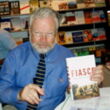The Age of Illusions: How America Squandered Its Cold War Victory
(Libby/OverDrive eBook, Kindle)
Available Platforms
Description
A thought-provoking and penetrating account of the post-Cold war follies and delusions that culminated in the age of Donald Trump from the bestselling author of The Limits of Power.When the Cold War ended with the fall of the Berlin Wall, the Washington establishment felt it had prevailed in a world-historical struggle. Our side had won, a verdict that was both decisive and irreversible. For the world’s “indispensable nation,” its “sole superpower,” the future looked very bright. History, having brought the United States to the very summit of power and prestige, had validated American-style liberal democratic capitalism as universally applicable.In the decades to come, Americans would put that claim to the test. They would embrace the promise of globalization as a source of unprecedented wealth while embarking on wide-ranging military campaigns to suppress disorder and enforce American values abroad, confident in the ability of U.S. forces to defeat any foe. Meanwhile, they placed all their bets on the White House to deliver on the promise of their Cold War triumph: unequaled prosperity, lasting peace, and absolute freedom. In The Age of Illusions, bestselling author Andrew Bacevich takes us from that moment of seemingly ultimate victory to the age of Trump, telling an epic tale of folly and delusion. Writing with his usual eloquence and vast knowledge, he explains how, within a quarter of a century, the United States ended up with gaping inequality, permanent war, moral confusion, and an increasingly angry and alienated population, as well, of course, as the strangest president in American history.
More Details
Similar Titles From NoveList
Similar Authors From NoveList
Published Reviews
Choice Review
Those unfamiliar with Bacevich's work will be thrilled to encounter a first-rate thinker whose trenchant, objective, well-written analyses defy glib labeling. Here, he examines American politics during the quarter century bracketed by the collapse of the Soviet Union and the election of Donald Trump (1991--2016). The new American consensus that emerged at the end of the Cold War was, as he argues, undergirded by four things: a triumphant neoliberalism, a global leadership based primarily on military power, an emphasis on personal freedom (sans notions of obligations or responsibilities), and the growing supremacy of the executive branch. The author deftly pulls apart the promises and policies of each presidential candidate and/or administration during this period, clearly showing that, except for hard-fought battles against sexist, racist, and homophobic practices (seen as an American Kulturkampf), successive officeholders blithely nurtured this post--Cold War consensus--unaware of the hardships many Americans faced. Voter resentment of policies that exacerbated economic inequality propelled Trump, whose outsider pose and simplistic answers proved seductive, into the White House. No fan of the current president, Bacevich (emer., Boston Univ.) sees him as a symptom--not the cause--of the US's problems. Summing Up: Highly recommended. All readership levels. --Robert T. Ingoglia, St.Thomas Aquinas College
Publisher's Weekly Review
America's post--Cold War hubris bred economic discontent, military quagmires, moral chaos, and Donald Trump's presidency, according to this sharp but unconvincing polemic. Boston University history professor Bacevich (The Limits of Power) posits a cohesive American identity built around middle-class prosperity, traditional morality, and anticommunism that lasted from WWII until the fall of the Berlin Wall. But after the Soviet Union's collapse, he contends, America pursued a deluded agenda of economic globalization that yielded inequality and insecurity, world leadership ambitions that hatched indecisive "forever wars," an unrealistic politics of "presidential supremacy," and divisive cultural and moral upheavals that privileged individual autonomy over self-discipline and social obligation. Bacevich traces these developments in tart sketches of the presidencies of Bill Clinton, George W. Bush, and Barack Obama, and of the resulting MAGA backlash. (He evenhandedly calls Trump "a noxious, venal blowhard" while disparaging the "protracted psychic orgasm" of the media's obsession with him.) Bacevich's assertion of a Cold War consensus is too pat--the era seethed with economic, military, and cultural conflict--and while his observations on the antagonism of modern-day politics sometimes hit home, they don't break new ground or suggest a plausible way around America's impasses. As a result, this righteous harangue fails to land many of its punches. (Jan.)
Kirkus Book Review
A brief, painful, and thoughtful analysis of how "the passing of the Cold War could not have been more disorienting."More than three decades ago, the United States took credit for defeating communism, and pundits predicted wonderful things. Readers wondering why they never happened should turn to the latest from Bacevich (Emeritus, History/Boston Univ.; (Twilight of the American Century, 2018, etc.). He notes how pundits proclaimed that, as the sole superpower, we would lead the world to a better future with global corporate capitalism enriching everyone. Freedom, in this new era, required a new conception that emphasized individual autonomy. The author laments the decline of traditional morality, and he argues that completing the new order is the concept of presidential supremacy, including a freedom to make war, which presidents employ enthusiastically. Although still considered sacred, Bacevich writes, our Constitution no longer describes a government of three equal branches. The results? Military operations regularly fail at great expense. Unfettered free enterprise has enriched the middle class but excluded many. The most secure career for a high school graduate is the military. The author condemns Donald Trump's three predecessors, who embraced the new order despite admitting that there were problems that they declined to fix. "Himself a mountebank of the very first order, Trump exposed as fraudulent the triumphalism that served as a signature of the post-Cold War decades," writes the author. "On this score, Trump mattered and bigly." Few readers would argue with Bacevich's conclusion that today's critical issues are fettering free enterprise in favor of those it excludes, confronting China's new superpower status, and dealing with climate change, but they're not catching on. Many Republicans grouse about Trump, but no groundswell opposes him. Democrats promote programs to fight poverty and promote social justice, thrilling their faithful but not former Democrats, some of whom still appreciate Trump's flamboyant rhetoric.A brilliant but ultimately discouraging analysis of how America messed up its big chance. Copyright Kirkus Reviews, used with permission.
Publishers Weekly Reviews
America's post–Cold War hubris bred economic discontent, military quagmires, moral chaos, and Donald Trump's presidency, according to this sharp but unconvincing polemic. Boston University history professor Bacevich (The Limits of Power) posits a cohesive American identity built around middle-class prosperity, traditional morality, and anticommunism that lasted from WWII until the fall of the Berlin Wall. But after the Soviet Union's collapse, he contends, America pursued a deluded agenda of economic globalization that yielded inequality and insecurity, world leadership ambitions that hatched indecisive "forever wars," an unrealistic politics of "presidential supremacy," and divisive cultural and moral upheavals that privileged individual autonomy over self-discipline and social obligation. Bacevich traces these developments in tart sketches of the presidencies of Bill Clinton, George W. Bush, and Barack Obama, and of the resulting MAGA backlash. (He evenhandedly calls Trump "a noxious, venal blowhard" while disparaging the "protracted psychic orgasm" of the media's obsession with him.) Bacevich's assertion of a Cold War consensus is too pat—the era seethed with economic, military, and cultural conflict—and while his observations on the antagonism of modern-day politics sometimes hit home, they don't break new ground or suggest a plausible way around America's impasses. As a result, this righteous harangue fails to land many of its punches. (Jan.)
Copyright 2019 Publishers Weekly.Reviews from GoodReads
Citations
Bacevich, A. (2020). The Age of Illusions: How America Squandered Its Cold War Victory . Henry Holt and Co..
Chicago / Turabian - Author Date Citation, 17th Edition (style guide)Bacevich, Andrew. 2020. The Age of Illusions: How America Squandered Its Cold War Victory. Henry Holt and Co.
Chicago / Turabian - Humanities (Notes and Bibliography) Citation, 17th Edition (style guide)Bacevich, Andrew. The Age of Illusions: How America Squandered Its Cold War Victory Henry Holt and Co, 2020.
Harvard Citation (style guide)Bacevich, A. (2020). The age of illusions: how america squandered its cold war victory. Henry Holt and Co.
MLA Citation, 9th Edition (style guide)Bacevich, Andrew. The Age of Illusions: How America Squandered Its Cold War Victory Henry Holt and Co., 2020.
Copy Details
| Collection | Owned | Available | Number of Holds |
|---|---|---|---|
| Libby | 1 | 1 | 1 |






























